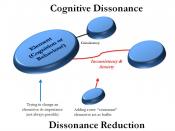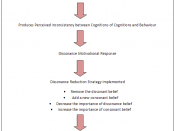Will Hunting, played by Matt Damon, in the movie "Good Will Hunting" is the epitome of a psychological paradigm. He can be analyzed in so many ways, touching on many of the different fields of psychology. The most interesting thing about Will is the cognitive dissonance he goes through throughout the film. He is torn between these two cognitions, both of which contradict each other. One of these cognitions is the fact that he is an orphan from South Boston, meaning he should only have a low pay job and live there for the rest of his life. It would be wrong of him to forget about his roots and try to become something of himself, which would be unfair to his friends who aren't as blessed as Will. On the other hand, he is a profoundly smart individually; to such a degree that Prof. Gerald Lambeau compares him to Einstein.
He knows he has potential to get out of South Boston and possibly do many great things with his superior intelligence, but he makes himself believe he doesn't want to because of this other cognition. This cognitive dissonance he bares is the one main thing that keeps him from making a concrete decision of moving on to be something better.
His intelligence is also something spectacular to look at, especially from a psychological approach. Although he has a much higher intelligence than others, the intelligence he has is concentrated on only one aspect of intelligence. His Componential intelligence is so over developed that it possibly caused the underdevelopment of his Contextual intelligence and emotional intelligence. His Componential intelligence is obviously much higher than others, which is seen when he works these complex math equations with such ease. His lack of Contextual intelligence is made very clear by...


